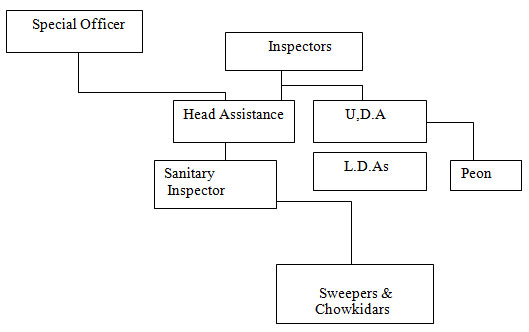Market, Agriculture Soil & Fishery Department.
Structure Man Power and Function of Markets, Fisheries
In pursuance of paragraph 11(eleven) of the sixth schedule to the constitution of India the rules and regulations made by the Executive Committee Jaintia Hills Autonomous District Council under paragraph 6(1) with the previous approval of the Governor of Meghalaya and assented to under sub paragraph 4 of paragraph 8 of the said schedule by the Governor of Meghalaya and published for general information of the market passed by the Jaintia Hills Autonomous District Council on November 1975, whereas it was provided that, for the matter in relating to fisheries in the United Khasi Jaintia Hills District Act No 1 of 1954. The Executive Committee may make rules for the purpose of development of fisheries herein after in this section mentioned and may by notification as it may deem appropriate of such rules and to rule water not being private water as to protect of fish in selected water subject to the approval of the District Council.
Structure Manpower of the Market Department

Control, Management and Establishment of market
The Jaintia Hills Autonomous District Management and Control of Markets Regulation 1975 under paragraph 6(1) and 8 of the Sixth Schedule to the constitution of India the District Council is competent to establish to levy and collect taxes on the entry of goods into the Market and collection of stall fee or rent on the markets stall within the Jaintia Hills Autonomous District Council. It extends to the whole of Jaintia Hills District. It shall come into force, as the Executive Committee may, by notification appoint. All markets in the District whether owned by the District Council, Dolloi or other administration shall be under the control of the Executive Committee of the District Council. The Executive Committee or the management was fixed to renew the stall's holder permit every year. No. stall holder shall sub let his/her stall to any other person. Also, no person or group of people shall establish any new market without the permission of the Executive Committee.
District Council markets are those markets which established and maintained by the District Council. Private markets are those markets which established by an individual or a group of people working together and subject to section 3(2) be continued to be managed to the provision of this regulation. Provided that stalls constructed by the stall holders themselves may be sublet only with the permission of the authorities concerned. Further that no transfer of any stall shall be affected except with the permission of the Executive Committee from time to time.
The Executive Committee may order any stall or building within the market place to be removed or dismantled. The Executive Committee may authorise in writing any of its officers to be in-charge of any one or more market. The secretary or the officer authorised in this behalf shall to publish the sale notice/tender Notice in the form as may be prescribed by the Executive Committee at least thirty days ahead of the date of sale and of the date fixed for opening of such tender.
Classes of Markets and their Location
There 4(Four) classes of market under the management and control of the Jaintia Hills Autonomous District Council:
- Private markets: Those markets owned by group of people or individual before the commencement of the District council shall continue to be managed by owners but shall be subject to the control of the District council, according to the provisions this Regulation.
- District Council markets: Those markets which used to be managed by the government before the establishment of the District Council shall come directly under the management and control of the District Council.
- Religious Markets: Those Markets which used to be managed by the Dolloi and the raid of the Elaka shall continue to be managed by the said body but shall be subject to the control of the District council, according to the provisions of this Regulation.
- Elaka Markets: Markets established by the Dolloiship of the Jaintia Hills District and managed by the Dolloi/Sirdar and their Durbars shall continue to be managed as such subject to the control of the District Council, and according to the provisions of this Regulation.
All markets within the jurisdiction of the Jaintia Hills Autonomous District Council and at present there are 14(fourteen)markets in number under the purview of District Council. Their name are —lawpynsin(Wahiajer), Khanduli, Khliehriat, Namdong, Lumshnong,Umkiang, Muktapur, Jarain, Kympreng, looksi, Chiehruphi, Mukhaialong and Dawki are all rural markets except Lawmusiang is urban market. At present, all rural markets are running either twice a week or weekly basis while the Lawmusiang (urban market) is transacting daily.
Principal Commodities
It includes all kind of materials, articles of food stuff, livestock and other merchandise being brought to the market for sale therein
Distance from headquarter
The distance of the different markets are as follows
| From | To | Distance in Kilometres |
|---|---|---|
| Jowai | Jarain | 25 |
| Jowai | Khanduli | 66 |
| Jowai | Kympreng | 62 |
| Jowai | VVahiajer | 12 |
| Jowai | Lumshnong | 64 |
| Jowai | Namdong | 48 |
| Jowai | Umkiang | 96 |
| Jowai | Muktapur | 56 |
| Jowai | Dawki | 64 |
| Jowai | Chiehruphi | 60 |
| Jowai | looksi | 52 |
| Jowai | Khliehriat | 34 |
| Jowai | Mukhaialong | 30 |
Ways and means for the development and improvement of market
The District Council earns revenue from this market by way of annual public auction or by way of letting out of stalls. Improvement of these markets in term of infrastructure and other amenities would greatly improve the socio economic condition of the people and the revenue of the District Council. Normally the settlement of the right to collect taxes by sale in public auction shall take place locally. Provided wherever resale is necessary on account of lack of participation due to non receipt of sale notice may be conducted in the office premises of the District Council. The successful tender shall deposit the entire amount on the day of opening tender. The market shall be put to resale if the Kist money is not deposited on the day of opening tender. The successful tenderer shall furnish security in cash or immovable property situated within the District. The Executive Committee may appoint for each market a Managing Committee which may consist of not less than five and not more than ten members including Chairman and Secretary.
Revenue earned yearly
The revenue from all District Council markets shall accrue to the District Council and shall be credited to the District Council fund.
The gross income from all private markets shall be shared equally between the District Council and the owners. Sale proceeds from such markets shall be credited to the District Council fund. The revenue from all Elaka and Religious market shall continue to be appropriated by the Dolloi and the Raj concerned. The Executive Committee may consider granting of financial benefits to the local guardian or Managing Committee of the District Council markets for the service rendered by such bodies. Markets subject to the minimum of 25 percent and maximum of 40 percent of the sale proceeds of the market concerned.
Management and Control of Fisheries
Water shall not cease to Bs "Private water" within the meaning of the definition by reason only that other persons may have by custom a right of fishery therein.
Destruction of fish by explosive and by poisoning water
If any person uses any dynamite or other explosive substance or any person or any person put any poison in any water with intend thereby to catch or destroy of the fish that may be therein, he shall be punishable with imprisonment for a term which may extent to two months or with fine which may extent to two hundred rupees, or with both.
Protection of fish in selected water by rules of the united Khasi Jaintia Autonomous District subject to the approval of the District Council. The Executive Committee may make rules for the purposes herein after in this section mentioned and may be notified in the Assam Gazette as it may deem appropriate apply to such rules water not being private water.
Such rules may prohibit, the erection and use of fixed engine (2) the construction of weirs and the dimension of the mashes and kinds of the nets to use. It may also prohibit all fishing in any specified water for a period not exceeding two years.








